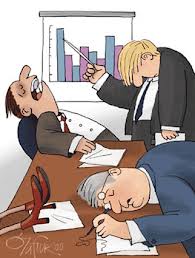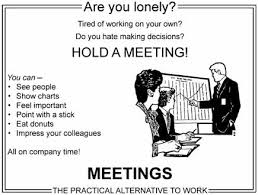Effective Meetings
Many meetings can be unproductive – the key to changing this is advance preparation (based on a book by Katherine Woods)
As technology advances, we spend more time communicating using email, text, web conferences and online social networks, but despite this, face-to-face meetings are still necessary. Unfortunately, many meetings are unproductive and frustrating and don’t make the best use of the time. Key to making meetings productive is the preparation in advance of a meeting. This is how to prepare so that your meetings are as effective as possible.
1. Is it worth it?
Think about whether you really need to have a meeting. Consider what you want to happen as a result of this meeting and whether you could achieve this without a face-to-face meeting. Many of the most time-wasting meetings are the ones that shouldn’t have been called in the first place.
2. Consider the outcome
Often, a meeting agenda is formed without a focus on the outcomes and on what the meeting can deliver, and it is useful to be as specific as possible. If your outcome is to generate ideas for a particular project, then it is useful to think through how many ideas are required and how creative you need them to be; if your outcome is to generate a plan, then consider what level of detail is required from the meeting.
3. Invite the right people
The challenge here is to make sure the critical experts and decision-makers are in the meeting and that bystanders and observers are minimised. There is nothing worse than realising a decision cannot be made in a meeting because a key person is not there or, alternatively, far too many people are involved who don’t need to be there.
4. Manage expectations
Meetings can often get derailed because there is misalignment around what people want from the meeting. Any time you can spend in advance of a meeting finding out what other participants want is time well spent.
5. Consider processes
What often gets prepared before meetings is the content: the topics that need to be discussed. However, equally important is the process, or how you will have the conversations.
 For example, if you want to get the group’s input into an idea, it is useful to prepare the information about the idea to present to the group (the content) but think about how you want them to contribute their feedback (the process). Each process needs to be designed to suit the group and outcomes required.
For example, if you want to get the group’s input into an idea, it is useful to prepare the information about the idea to present to the group (the content) but think about how you want them to contribute their feedback (the process). Each process needs to be designed to suit the group and outcomes required.
6. Decision making
There are broadly three types of decision-making in groups: executive/expert; rule based (for example, majority decision); and consensus. In most group situations, people will assume they are being involved in making the decision unless told otherwise, so it’s important to be clear about what decision-making method is appropriate and clarify this with the group.
7. Have the right documentation
Often lengthy minutes and reports are produced from meetings when all that was needed was the list of actions. Remember the power of group memory when producing meeting outputs. The people in the meeting will have a strong link to the format the information was produced in, so it is useful to make the documentation similar to this after the meeting. For example, if the group produces a plan in the meeting using sticky notes on a timeline, then it is useful for the documentation to look like this, even if it gets put into an electronic format.
8. Follow up
Even when people are committed to the actions they agree to in meetings, follow up is needed to support that commitment. At the most basic level, publishing the agreements by email or on a website means people can find a record of their actions. It is also important to have status checks to help keep things on track.
Key points
– Double-check that the meeting is actually necessary.
– Think about the outcome you hope to achieve.
– Invite only the necessary people and find out their expectations in order to help you
Plan the meeting.
– Tell them how the meeting will be conducted and who will be making the decisions.
– Use appropriate documentation and aids for the meeting and similarly for follow-up.
